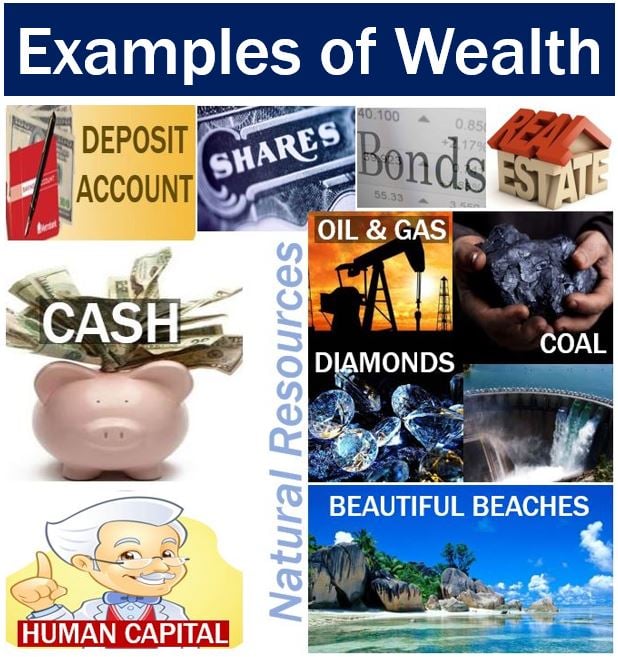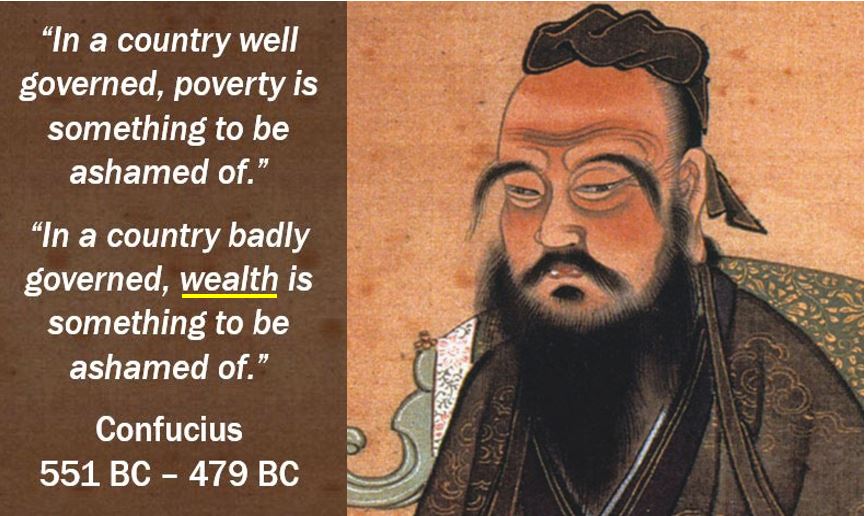Wealth – definition and meaning
Wealth has slightly different meanings, depending whether it is used in a personal, economic, accounting, spiritual, or philosophical, context. This article focuses just on its meanings when used in business, finance, and economic settings.
In general, wealth refers to intangible and tangible things that make people, households, groups, towns, or even whole nations better off, i.e. richer.
In accounting, wealth is a business’, person’s, or any entity’s accumulated tangible cash, buildings, land, etc., and intangible saleable possessions, minus all his, her or its liabilities. Examples of intangible items are trademarks, copyright and patents.
In economics, it is the total of all assets of a country or any economic unit that currently generate income or can potentially generate income in the future. For example, Russia has vast natural resources, while Japan has human capital – both natural resources and human capital are examples of wealth.
 Anything that we, companies, or countries possess that is valuable and/or has the potential to generate income is an example of wealth.
Anything that we, companies, or countries possess that is valuable and/or has the potential to generate income is an example of wealth.
In some economic calculations, money and securities – which represent only claims to wealth – may be excluded.
According to Dictionary.Cambridge.org, wealth is:
“A large amount of money or valuable possessions that someone has.
Income vs. wealth
The two terms are related, but they do not have the same meaning. Wealth is a stock concept – it is a large amount of valuable possessions – while income is a flow of money.
Wealth: for individual people like you and me, it can be held in a variety of forms:
– Savings held in deposit accounts in banks.
– Possession of government and corporate bonds.
– Equity stakes in private companies, and ownership of shares issued by public companies (listed in stock markets).
– Money held in life assurance and occupational pension schemes.
– Property ownership.
Income: this is the flow of money going to factors of production, and may include:
– Rent paid to landlords.
– The wages and salaries of employees.
– State pension, tax credits, unemployment benefits, and other money paid in the form of welfare benefits to individuals or households.
– Dividends paid to shareholders, as well as interest paid to bank account and bond holders.
 Confucius was a Chinese teacher, politician, editor and philosopher of the Spring and Autumn period of Chinese history. Confucius’ philosophy emphasized governmental and personal justice, sincerity, morality, and correctness of social relationships. (Image: adapted from biography.com)
Confucius was a Chinese teacher, politician, editor and philosopher of the Spring and Autumn period of Chinese history. Confucius’ philosophy emphasized governmental and personal justice, sincerity, morality, and correctness of social relationships. (Image: adapted from biography.com)
Amount of wealth in the world
The Global Wealth Report 2016, published by the Credit Suisse Research Institute, says that the total amount of wealth in the world in 2016 was $256,000,000,000,000 or $256 trillion. The 2016 total was 1.4% or $3.5 trillion greater than in 2015, which just about kept up with the pace of population growth.
Wealth per adult in 2016 remained unchanged compared to 2015 – at $52,800 – this was the first time there was no change over a 1-year period since 2008.
In 2016, Japan and the United States posted considerable increases, while the United Kingdom registered a significant decline. When the British electorate voted for Brexit – to leave the European Union – the pound sterling devalued by over 15%.
The report authors informed that wealth inequality continues to rise. The difference between the richest 1%, the wealthiest 10%, and the rest of the population has been growing.
The authors wrote:
“While the bottom half collectively own less than 1 percent of total wealth, the wealthiest top 10 percent own 89 percent of all global assets.”
 Mohandas Karamchand Gandhi (Mahatma Gandhi) was the leader of the Indian independence movement in British-ruled India. He led his country to independence employing non-violent civil disobedience. In India, he is also known as Bapu, which in Gujarati means ‘father, papa’. (Image: adapted from 121clicks.com/inspirations/remembering-gandhi)
Mohandas Karamchand Gandhi (Mahatma Gandhi) was the leader of the Indian independence movement in British-ruled India. He led his country to independence employing non-violent civil disobedience. In India, he is also known as Bapu, which in Gujarati means ‘father, papa’. (Image: adapted from 121clicks.com/inspirations/remembering-gandhi)
Wealth in other languages:
EUROPE, AMERICAS & AUSTRALASIA: Richesse (French), Riqueza (Spanish, Portuguese), Ricchezza (Italian), Reichtum (German), Rijkdom (Dutch), Rikedom (Swedish), Rikdom (Norwegian), Rigdom (Danish), Varallisuus (Finnish), Богатство (Russian, Serbian), Bohatství (Czech), Bohatstvo (Slovak), Bogatie (Romanian), Bogactwo (Polish), Jólét (Hungarian), Pasuri (Albanian), Πλούτος (Greek), and Servet (Turkish).
ASIA & MIDDLE EAST: الثروة (Arabic), עוֹשֶׁר (Hebrew), ثروت (Persian), ویلتھ (Urdu), धन (Hindi), વેલ્થ (Gujarati), ধন (Bengali), 财富 (Chinese), 富 (Japanese), 부 (Korean), ความมั่งคั่ง (Thai), Sự giàu có (Vietnamese), yaman (Filipino), and Kekayaan (Indonesian, Malay).
AFRICA: Mali (Swahili), Rykdom (Afrikaans), ሀብት (Amharic), Leruo (Sesotho), Upfumi (Shona), Oro (Yoruba), Umcebo (Zulu).

